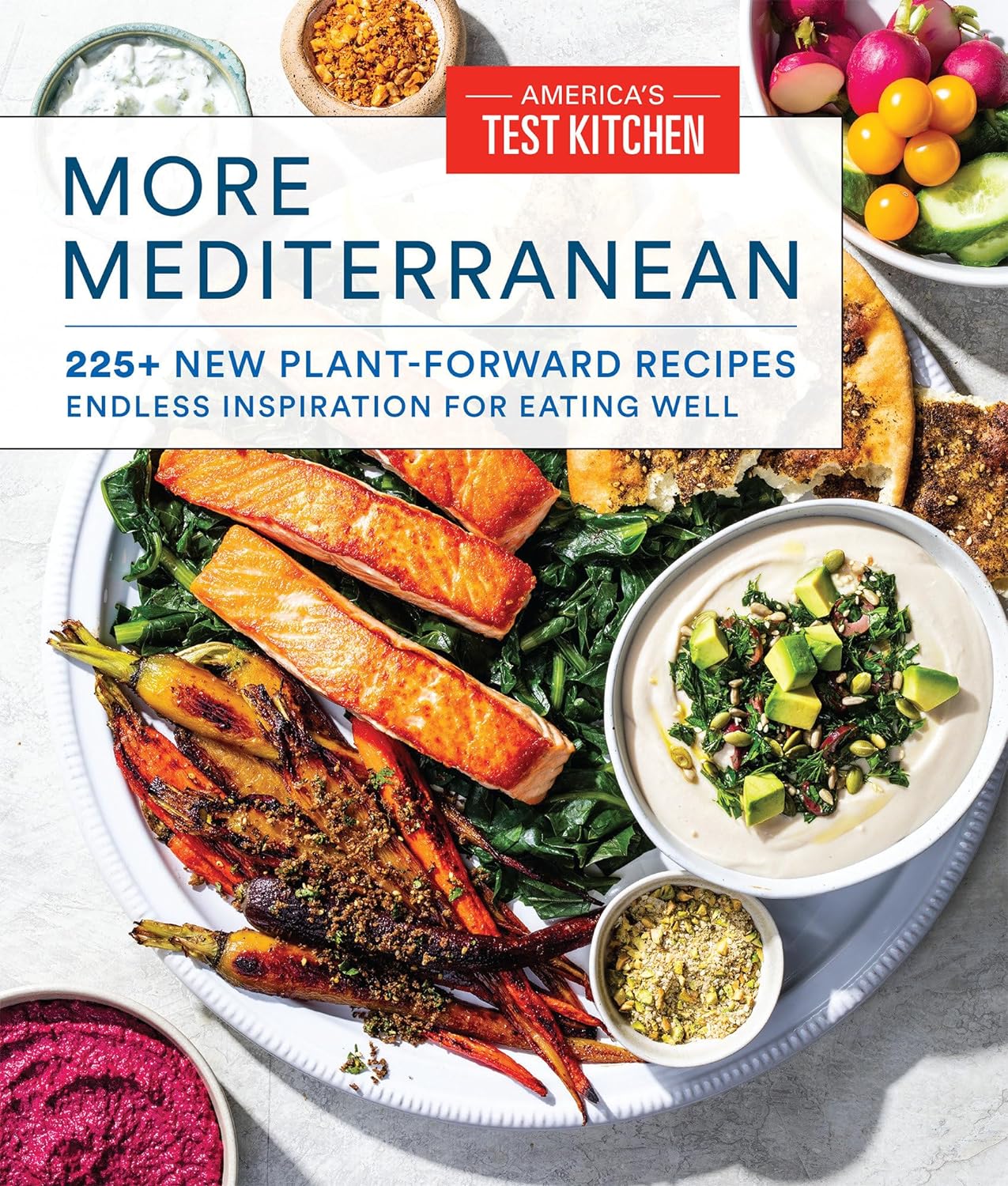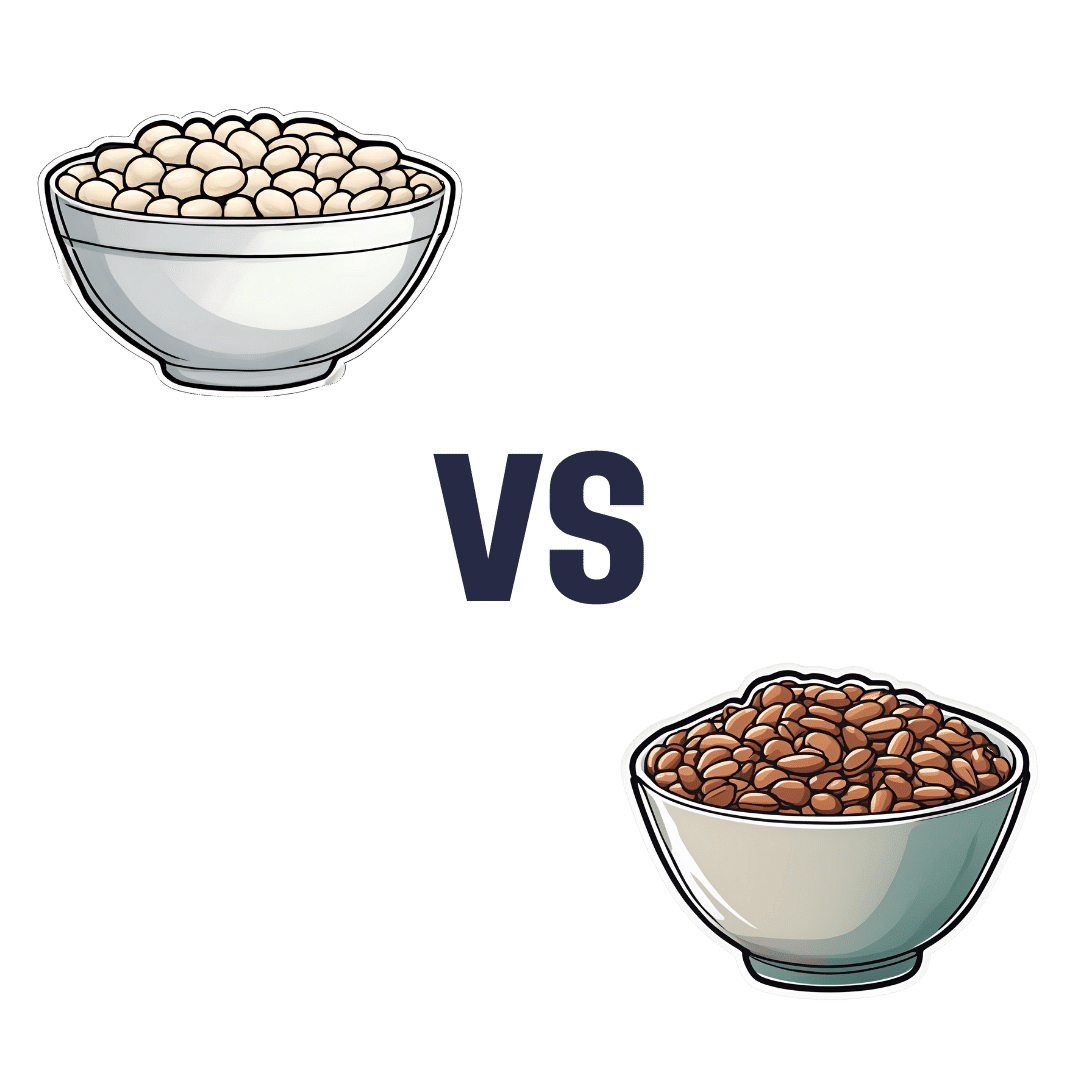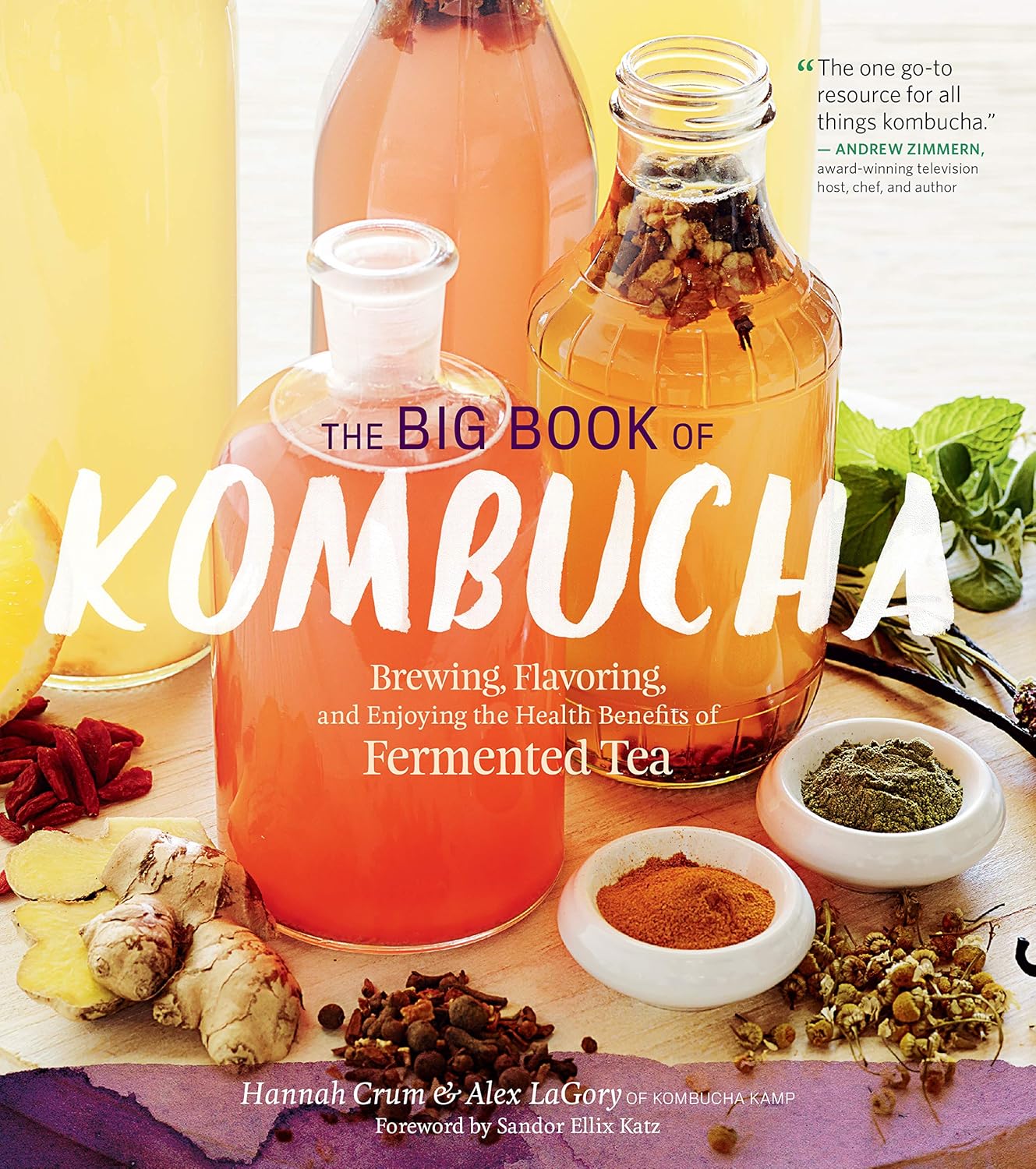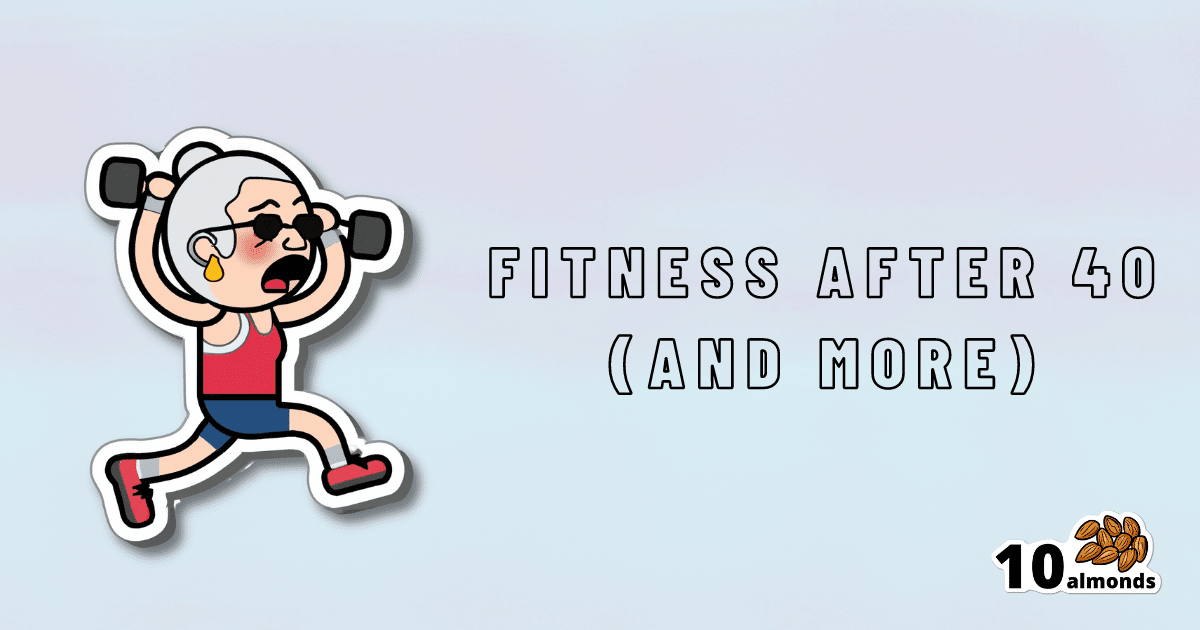
More Mediterranean – by American’s Test Kitchen
10almonds is reader-supported. We may, at no cost to you, receive a portion of sales if you purchase a product through a link in this article.
Regular 10almonds readers will know that we talk about the Mediterranean diet often, and with good reason; it’s been for quite a while now the “Gold Standard” when it comes to scientific consensus on what constitutes a good diet for healthy longevity.
However, it’s easy to get stuck in a rut of cooking the same three meals and thinking “I must do something different, but not today, because I have these ingredients and don’t know what to cook” and then when one is grocery-shopping, it’s “I should have researched a new thing to cook, but since I haven’t, I’ll just get the ingredients for what I usually cook, since we need to eat”, and so the cycle continues.
This book will help break you out of that cycle! With (as the subtitle promises) hundreds of recipes, there’s no shortage of good ideas. The recipes are “plant-forward” rather than plant-based per se (i.e. there are some animal products in them), though for the vegetarians and vegans, it’s nothing that’s any challenge to substitute.
Bottom line: if you’re looking for “delicious and nutritious”, this book is sure to put a rainbow on your plate and a smile on your face.
Click here to check out More Mediterranean, and inspire your kitchen!
Don’t Forget…
Did you arrive here from our newsletter? Don’t forget to return to the email to continue learning!
Recommended
Learn to Age Gracefully
Join the 98k+ American women taking control of their health & aging with our 100% free (and fun!) daily emails:
-
White Beans vs Pinto Beans – Which is Healthier?
10almonds is reader-supported. We may, at no cost to you, receive a portion of sales if you purchase a product through a link in this article.
Our Verdict
When comparing white beans to pinto beans, we picked the pinto beans.
Why?
Both are good and both have their strengths! But we say the pinto beans come out on top in total:
In terms of macros, the two beans are about equal in protein and carbs, while pinto beans have notably more fiber. White beans were already good, but we say having 1.5x the fiber makes pinto beans the winner in this category.
In the category of vitamins, white beans are not higher in any vitamins, while pinto beans have more of vitamins B1, B2, B3, B6, B7, B9, and C, making for a 7:0 win for pinto beans. It’s worth mentioning that both beans are equal in vitamins B5, E, K, and choline, though. Still, pinto beans win easily on the strength of those 7 vitamins they have more of.
When it comes to minerals, white beans have more calcium, copper, iron, magnesium, manganese, potassium, and zinc, while pinto beans have more phosphorus and selenium, making for a win for white beans this time.
Adding up the sections makes for an overall win for pinto beans, but by all means, enjoy either or both; diversity is good!
Want to learn more?
You might like to read:
What’s Your Plant Diversity Score?
Take care!
Share This Post
-
Wholewheat Bread vs Seeded White – Which is Healthier?
10almonds is reader-supported. We may, at no cost to you, receive a portion of sales if you purchase a product through a link in this article.
Our Verdict
When comparing wholewheat bread to seeded bread, we picked the wholewheat.
Why?
First, we will acknowledge that this is a false dichotomy; it is possible to have seeded wholewheat bread. However, it is very common to have wholewheat bread that isn’t seeded, and white bread that is seeded. So, it’s important to be able to decide which is the healthier option, since very often, this false dichotomy is what’s on offer.
We will also advise checking labels (or the baker, if getting from a bakery) to ensure that visibly brown bread is actually wholewheat, and not just dyed brown with caramel coloring or such (yes, that is a thing that some companies do).
Now, as for why we chose the wholewheat over the seeded white…
In terms of macronutrients, wholewheat bread has (on average; individual breads may vary of course) has 2x the protein and a lot more fiber.
Those seeds in seeded bread? They just aren’t enough to make a big impact on the overall nutritional value of the bread in those regards. Per slice, you are getting, what, 10 seeds maybe? This is not a meaningful dietary source of much.
Seeded bread does have proportionally more healthy fats, but the doses are still so low as to make it not worth the while; it just looks like a lot of expressed as a percentage of comparison, because of the wholewheat bread has trace amounts, and the seeded bread has several times those trace amounts, it’s still a tiny amount. So, we’d recommend looking to other sources for those healthy fats.
Maybe dip your bread, of whatever kind, into extra virgin olive oil, for example.
Wholewheat bread of course also has a lower glycemic index. Those seeds in seeded white bread don’t really slow it down at all, because they’re not digested until later.
Want to learn more?
You might like to read:
- Carb-Strong or Carb-Wrong?
- Level-Up Your Fiber Intake! (Without Difficulty Or Discomfort)
- Gluten: What’s The Truth?
Enjoy!
Share This Post
-
The Big Book of Kombucha – by Hannah Crum & Alex LaGory
10almonds is reader-supported. We may, at no cost to you, receive a portion of sales if you purchase a product through a link in this article.
If you’ve been thinking “I should get into kombucha”, then this is the universe prompting you, because with in this book’s 400 pages is all the information you need and more.
Because, it’s understandable to be wary when starting out, from “what if my jar explodes” to “what if I poison my family”, but the authors (and photographer) take every care to ensure that everything goes perfectly, guiding us through everything from start to finish, including very many high-quality color photos of what things should (and shouldn’t) look like.
On which note, that does mean that to enjoy the color you should get a physical copy or Kindle Fire, not a Kindle e-ink version (as then it’d be black and white).
There’s also a comprehensive section on troubleshooting, as well as hundreds of recipes for all kinds of flavors and occasions.
Bottom line: in the category of books that could reasonably be called “The Bible of…”, this one’s the “The Bible of Kombucha”.
Click here to check out The Big Book Of Kombucha, and get brewing!
Share This Post
Related Posts
-
Infections, Heart Failure, & More
10almonds is reader-supported. We may, at no cost to you, receive a portion of sales if you purchase a product through a link in this article.
Some health news to round off the week:
The Infection That Leads To Heart Failure
It’s long been held that, for example, flossing reduces heart disease risk, with the hypothesis being that if plaque bacteria enter the blood stream, well, that’s an even worse place for plaque bacteria to be. Now, with much more data, attention has turned to
- actual infections, and
- actual heart failure
Way to up the ante! And, it holds true regardless of what kind of infection. So, you might think that a UTI, for example, is surely “downstream” and should not affect the heart, but it does. Because of this, researchers currently believe that it is not the infection itself, so much as the body’s inflammation response to infection, that leads to the heart failure. Which is reasonable, because, for example, atherosclerosis is made mostly not of cholesterol itself, but rather mostly of dead immune cells that got stuck in the cholesterol.
Moreover, it’s not so much about the acute inflammatory response (which is almost always a good thing, circumstantially), but rather that after cases where an infection managed to take hold, the immune system can then often stay on high alert for many years alter. Long COVID is an obvious recent example of this, but it’s hardly a new phenomenon; see for example post-polio syndrome, and consider how many more such post-infection maladies are likely to exist that never got a name because they flew under the radar or got diagnosed as fibromyalgia or something (fibromyalgia is a common diagnosis doctors give when they acknowledge something’s wrong, and it causes pain and exhaustion, but they don’t know what, and it appears to be stable—so while it can be helpful to put a name to the collection of symptoms, it’s a non-diagnosis diagnosis on the doctors’ part. It’s saying “I diagnose you with hurty tiredness”).
The take-away from all this? Avoid infections, for your heart’s sake, and if you do get an infection, take it seriously even if it’s minor. The safe amount of infection is “no infection”.
Read in full: Study uncovers new link between infections and heart failure
Cold Water Immersion: Hot Or Not?
The evidence is clear for some benefits; for others, not so much:
- It’s great (if you’re already in fair health, and definitely not if you have a heart condition) to improve circulation and stress response
- There may be some benefits to immune function, but however reasonable the hypothesis, actual evidence is thin on the ground
- The oft-hyped mood benefits are a) marginal b) short-lived, with benefits fading after 3 months of regular cold baths/showers/etc
Read in full: The big chill: Is cold-water immersion good for our health?
Related: Ice Baths: To Dip Or Not To Dip?
The Unspoken Trials Of Going To The Gym (While Being A Woman)
Public health decision-makers often think that getting people to go to the gym more is a matter of public information, or perhaps branding. Some who have their thinking heads on might even realize that there may be economic factors for many. But for women, there’s an additional factor—or rather, an additionally prominent factor. The study we’ll link started with this observation (please read it in the voice of your favorite nature documentary narrator):
❝Despite an increase in gym memberships, women are less active than men and little is known about the barriers women face when navigating gym spaces.❞
What then, of these shy, elusive creatures that make up a mere 51% of the world’s population?
A medium-sized (n=279) study of women, of whom 84% being current gym-goers, reported often feeling “judged for their appearance or performance, as well as having to fight for space in the gym and to be taken seriously, while navigating harassment and unsolicited comments from men”
Even gym attire becomes an issue:
❝Aligning with previous literature, women often chose attire based on comfort and functionality. However, their choices were also influenced by comparisons with others or fear of judgement for wearing non-branded attire or looking too put together. Many women also chose gym attire to hide perceived problem areas or avoid appearance concerns, including visible sweat stains.❞
…which main seem silly; you’re at the gym, of course you’re going to sweat, but if you’re the only one with visible sweat stains, then there can be social consequences (bad ones).
Similarly, there’s a “damned if you do; damned if you don’t” when it comes to working out while fat—on the one hand, society conflates fatness with laziness; on the other, it can be extra intimidating to be the only fat person in a gym full of people who look like they’re going to audition for a superhero movie.
❝In the gym, just like in other areas of life, women often feel stuck between being seen as ‘too much’ and ‘not enough’, dealing with judgement about how they look, how they perform, and even how much space they take up. Even though the pressure to be super thin is decreasing, the growing focus on being muscular and athletic is creating new challenges. It is pushing unrealistic standards that can negatively affect women’s body image and overall well-being.❞
Writer’s note: I live a few minutes walk from my nearest gym, and I work out at home instead. This way, if I want to do yoga in my pajamas, I can. If I want to use my treadmill naked and watch my T+A bounce in the mirror, I can. If I want to lift weights in the dress I happened to be wearing, I can. Alas that I can’t swim at home!
Read in full: Women face multiple barriers while exercising in gyms
Related: Body Image Dissatisfaction/Appreciation Across The Ages
Take care!
Don’t Forget…
Did you arrive here from our newsletter? Don’t forget to return to the email to continue learning!
Learn to Age Gracefully
Join the 98k+ American women taking control of their health & aging with our 100% free (and fun!) daily emails:
-
10almonds Subcribers Take The Wheel!
10almonds is reader-supported. We may, at no cost to you, receive a portion of sales if you purchase a product through a link in this article.
❓ Q&A With 10almonds Subscribers!
Q: What kind of salt is best for neti pots?
A: Non-iodised salt is usually recommended, but really, any human-safe salt is fine. By this we mean for example:
- Sodium chloride (like most kitchen salts),
- Potassium chloride (as found in “reduced sodium” kitchen salts), or
- Magnesium sulfate (also known as epsom salts).
Q: You talked about spearmint as reducing testosterone levels, what about ginseng for increasing them?
A: Hormones are complicated and often it’s not a simple matter of higher or lower levels! It can also be a matter of…
- how your body converts one thing into another
- how your body responds (or not) to something according to how the relevant hormone’s receptors are doing
- …and whether there’s anything else blocking those receptors.
All this to say: spearmint categorically is an anti-androgen, but the mechanism of action remains uncertain.
Panax ginseng, meanwhile, is one of the most well-established mysteries in herbal medicine.
Paradoxically, it seems to improve both male and female hormonal regulation, despite being more commonly associated with the former.
- It doesn’t necessarily increase or decrease testosterone or estrogen levels (but it can, even if indirectly)
- It does improve sexual function
- …and alleviates symptoms associated with conditions as varied as:
- Late-onset hypogonadism (common for men during the andropause)
- Benign prostate hyperplasia (again common for men during the andropause)
- …and also counteracts unwanted side-effects of finasteride. Finasteride is often taken by men as a hair loss remedy or, less often but critically, in the case of an enlarged prostate.
But it also…
- Alleviates symptoms of PCOS (polycystic ovary syndrome, which effects around 20% of women)
- May even be an effective treatment for PCOS (rat model only so far)
- It also may improve female reproductive fertility more generally (the studies are down to fruit flies now though)
Bottom line: Panax ginseng is popularly taken to improve natural hormone function, a task at which it appears to excel.
Scientists are still working out exactly how it does the many things it appears to do.
Progress has been made, and it clearly is science rather than witchcraft, but there are still far more unanswered questions than resolved ones!
Q: I like that the quizzes (I’ve done two so far) give immediate results , with no “give us your email to get your results”. Thanks!
A: You’re welcome! That’s one of the factors that influences what things we include here! Our mission statement is “to make health and productivity crazy simple”, and the unwritten part of that is making sure to save your time and energy wherever we reasonably can!
Q: Do you know if adrafanil is as good as modafinil? It seems to be a lot cheaper for the same result?
A: Adrafinil is the pro-drug of modafinil. What this means is that if you take it, your own liver will use it to make modafinil inside you. So the end result is chemically the same drug.
As to whether it’s as good, it depends what you need. It’s worth noting that anything that taxes liver function can be harmful if you take too much, and/or your liver is already strained for some reason.
If in doubt, consult a doctor! And if it’s something that’s accessible to you, a recent lipids test (a kind of blood test that checks your liver health) is always a good thing to have.
Q: Would love to see your take on polyphasic sleep!
A: Watch this space
Don’t Forget…
Did you arrive here from our newsletter? Don’t forget to return to the email to continue learning!
Learn to Age Gracefully
Join the 98k+ American women taking control of their health & aging with our 100% free (and fun!) daily emails:
-
For tennis star Destanee Aiava, borderline personality disorder felt like ‘a death sentence’ – and a relief. What is it?
10almonds is reader-supported. We may, at no cost to you, receive a portion of sales if you purchase a product through a link in this article.
Last week, Australian Open player Destanee Aiava revealed she had struggled with borderline personality disorder.
The tennis player said a formal diagnosis, after suicidal behaviour and severe panic attacks, “was a relief”. But “it also felt like a death sentence because it’s something that I have to live with my whole life”.
A diagnosis is often associated with therapeutic nihilism. This means it’s viewed as impossible to treat, and can leave clinicians and people with the condition in despair.
In fact, people with this disorder can and do recover with adequate support. Understanding it is caused by trauma is fundamental to effectively treat this complex and poorly understood mental illness.
A stigmatising diagnosis
The name “borderline personality disorder” is confusing and adds greatly to the stigma around it.
Doctors first used “borderline” to describe a condition they believed was in-between two others: neurosis and psychosis.
But this implies the condition is not real in itself, and can invalidate the suffering and distress the person and their loved ones experience.
“Personality disorder” is a judgemental term that describes the very essence of a person – their personality – as flawed.
What is borderline personality disorder?
People with the disorder can express a range of symptoms, but high levels of anxiety – including panic attacks – are usually constant.
Symptoms cluster around four main areas:
- high impulsivity (leading to suicidal thoughts and behaviour, self-harm and other risky behaviours)
- unstable or poor sense of self (including low self-esteem)
- mood disturbances (including intense, inappropriate anger, episodic depression or mania)
- problems in relationships.
People with the disorder greatly fear being abandoned and as a result, commonly have distressing difficulties in interpersonal relationships.
This creates a “push-pull” dynamic with loved ones, as people with borderline personality disorder seek closeness, but push away those they love to test the strength of the relationship.
For example, they may escalate a small issue into a major disagreement to see if the loved one will “stick with them” and reinforce their love.
Conversely, if a loved one appears distant or fed up – for example, is thinking about ending the relationship – the person with borderline personality disorder will make major efforts to “pull” them back. This might look like a flurry of messages, expressions of despair, or even suicidal behaviours.
People with borderline personality disorder greatly fear being abandoned, making relationship issues common. Drazen Zigic/Shutterstock Who does it affect?
The disorder affects one in 100 Australians, although this is likely a conservative estimate, as diagnosis is based on the most severe symptoms.
Women are much more likely to be diagnosed with it than men – but why this is so remains a major debate, with political and sociological factors playing a role in making psychiatric diagnoses. Symptoms usually begin in the mid to late teens.
While an initial response to receiving a diagnosis can be comforting for some, it is commonly seen as a chronic, relapsing condition, meaning symptoms can return after a period of improvement.
Borderline personality disorder can fluctuate in intensity and mimic other conditions such as major depression, bipolar disorder, anxiety disorders and psychosis.
Estimates suggest 26% of presentations at emergency departments for mental health issues are by people diagnosed with personality disorders, particularly borderline personality disorder.
What causes it?
The main cause for borderline personality disorder appears to be trauma in early life, compounded by repeated traumas later.
Early life trauma can lead to biological changes in the brain that cause behavioural, emotional or cognitive shifts, leading to social and relationship issues. This is known as complex post-traumatic stress disorder.
Aiava has acknowledged the disorder is “mainly from childhood trauma”, although she has not given details about her specific experiences.
People with borderline personality disorder usually have complex post-traumatic stress disorder. But complex post-traumatic stress disorder doesn’t always result in a borderline personality disorder diagnosis.
Although the two disorders are not identical, they share many similarities, in particular that they are both caused by complex and repeated trauma.
However those with borderline personality disorder tend to experience more rage, emotional disturbances and have a greater fear of abandonment.
They also face greater stigma, whereas the term “complex post-traumatic stress disorder” doesn’t carry the same negative connotations and focuses on the cause of the condition – trauma – rather than “personality”, leading to better treatment options.
The recognition of the major role of trauma in borderline personality disorder is an important step forward in treating the disorder. But because of the stigma associated with it, using the diagnosis of complex post-traumatic stress disorder maybe a better step forward in the future.
Can it be treated?
There are many effective psychological therapies and other treatments for people with borderline personality disorder or complex post-traumatic stress disorder.
For example, dialectical behavioural therapy is a type of cognitive therapy that helps people learn skills such as tolerating distress, managing relationships, regulating emotions and practising mindfulness.
The treatment of people with post-traumatic stress disorder, including victims of war and rape, has taught us a lot about how to treat complex, underlying trauma. For example, with trauma-focused psychological therapies.
Other new treatments, such as eye movement desensitisation and reprogramming, have also shown to be effective.
Many people with borderline personality disorder who receive treatment and have supportive relationships are able to “outgrow” the condition. Others may need to continue to manage symptoms while pursuing a good quality of life.
Treating trauma, not personality
Rethinking borderline personality disorder as a trauma disorder enables a more effective and understanding approach for those with it.
Understanding what trauma does to the brain means newer, targeted medications can also be used.
For example, our research has shown how the brain’s glutamate system – the chemicals responsible for learning and making sense of one’s environment – is overactive in people with complex post-traumtic stress disorder. Medications that work on the glutumate system may therefore help alleviate borderline personality disorder symptoms.
Educating partners and families about borderline personality disorder, providing them support and co-designing crisis strategies are also important parts of total care. Preventing early life trauma is also critical.
If this article has raised issues for you, or if you’re concerned about someone you know, call Lifeline on 13 11 14.
Jayashri Kulkarni, Professor of Psychiatry, Monash University and Eveline Mu, Research Fellow in Women’s Mental Health, Monash University
This article is republished from The Conversation under a Creative Commons license. Read the original article.
Don’t Forget…
Did you arrive here from our newsletter? Don’t forget to return to the email to continue learning!
Learn to Age Gracefully
Join the 98k+ American women taking control of their health & aging with our 100% free (and fun!) daily emails:








